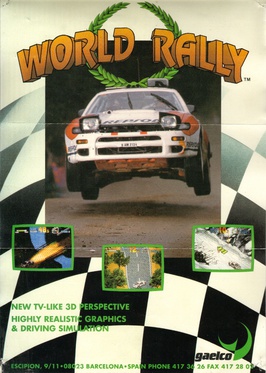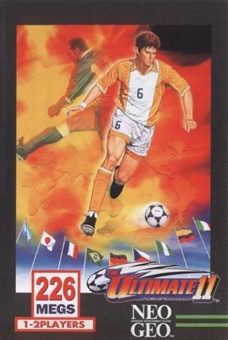
SNK Corporation is a Japanese video gaming and interactive entertainment company. It was founded in 1978 as Shin Nihon Kikaku by Eikichi Kawasaki and began by developing coin-op games. SNK is known for its Neo Geo arcade system on which the company produced many in-house games and now-classic franchises during the 1990s, including Aggressors of Dark Kombat, Art of Fighting, Fatal Fury, King of the Monsters, Metal Slug, Samurai Shodown, The King of Fighters, The Last Blade, Twinkle Star Sprites, and World Heroes; they continue to develop and publish new titles in some of these franchises on contemporary arcade and home platforms. Since the 2000s, SNK have diversified from their traditional arcade focus into pachislot machines, mobile game development, and recently character licensing.

Atari Games Corporation was an American producer of arcade video games, active from 1985 to 1999, then as Midway Games West Inc. until 2003. It was formed when the coin-operated video game division of Atari, Inc. was transferred by its owner Warner Communications to a joint venture with Namco, being one of several successor companies to use the name Atari.

Centipede is a 1981 fixed shooter video game developed and published by Atari for arcades. Designed by Dona Bailey and Ed Logg, it was one of the most commercially successful games from the golden age of arcade video games and one of the first with a significant female player base. The primary objective is to shoot all the segments of a centipede that winds down the playing field. An arcade sequel, Millipede, followed in 1982.

Big Karnak is a 1991 platform arcade video game developed and released by Gaelco. Taking place in an Ancient Egypt setting, players assume the role of a pharaoh warrior who embarks on a journey to save his wife while fighting against mythical beings and Egyptian gods. The game was a commercial success for Gaelco and garnered positive reception from critics.

The King of Fighters XI(KOF XI) is a 2005 2D fighting game produced by SNK Playmore. It is the eleventh installment in The King of Fighters series following The King of Fighters 2003. Originally released as a coin-operated arcade game for the Atomiswave platform, a home version for the PlayStation 2 was released in Japan in 2006, followed by releases in the PAL region and North America in 2007. It is the second The King of Fighters game to not run on the Neo Geo following its predecessor, The King of Fighters Neowave and also the first major canonical entry to not be named after its year of release.

The King of Fighters 2006, known in Japan as KOF: Maximum Impact 2, is a 3D fighting video game produced by SNK Playmore and released for the PlayStation 2 in 2006. An updated version was released on both PlayStation 2 and arcades in Japan under the title KOF: Maximum Impact Regulation A in 2008. It is the sequel to KOF: Maximum Impact (2004), which itself is a spinoff of The King of Fighters (KOF) series.

Barkley Shut Up and Jam! is a basketball video game originally developed and published by Accolade for the Sega Genesis on North America in March 1994 and later in Europe in April 1994. The game is the first entry in the Barkley Shut Up and Jam series, featuring former NBA MVP Charles Barkley prominently and as one of the playable characters.

Arabian is a 1983 arcade platform game developed and published by Sun Electronics (Sunsoft) in Japan, and Atari, Inc. in North America. A Famicom version was developed and released by Sunsoft only in Japan as Super Arabian. A distinct port for home computers developed by Interceptor Software was released as Tales of the Arabian Nights.

Alligator Hunt is a shoot 'em up arcade game released by Spanish company Gaelco in 1994.

Gabinete Electrónico Consultivo, S.A., but is trademarked and better known as Gaelco, S.A., is a Spanish company that develops and publishes arcade games and video games. As of 2007, Gaelco develops electronic dart machines under the name of "Gaelco Darts".

Evoga Entertainment was a Mexican video game company.

Rage of the Dragons is a 2002 tag team head-to-head fighting game released for the Neo Geo hardware by Playmore. The game was developed by Japanese company Noise Factory, co-developed by BrezzaSoft and chiefly-designed by the Mexican team Evoga. As of May 2020, Piko Interactive has acquired the game's IP and has expressed interest in using it in some way. Ports for Nintendo Switch, PlayStation 4 and PlayStation 5, Microsoft Windows, and Xbox One and Xbox Series were released on November 14, 2024, ported by QUByte Interactive. In April 2024, during EVO Japan it was announced that new Rage Of The Dragons game called Rage of the Dragons W is in the works for ExA-Arcadia arcade port.

Bit Managers, formerly known as New Frontier, was a video game developer based in Barcelona (Spain). It was co-founded by Alberto Jose González, who composed the music for all of their games except Bang!, a coin-operated arcade machine.

Piko Interactive LLC is an American video game publisher based in San Antonio, Texas. Founded in early 2013 by Eli Galindo, the company focuses on physical re-releases of games from older video game consoles and digitally released ports to newer systems.

World Rally is a 1993 racing arcade video game developed by Zigurat Software and published by Gaelco in Spain, Sigma in Japan and Atari Games in North America. Themed around rallying, the game pit players with races across various locations under a short time limit to qualify for the next course.

Prehistoric Isle is a 1989 scrolling shooter arcade video game originally developed and published by SNK. Set during the 1930s, where ships at The Bahamas mysteriously disappeared, players assume the role of U.S. Marine pilots taking control of biplanes in a reconnaissance assignment at "Greenhell Isle", a fictional island inhabited by dinosaurs and creatures thought to be extinct. Headed by a director under the pseudonym of "Yah!", the game was developed by most of the same team that would later work on several projects for the Neo Geo platforms at SNK. First launched in arcades, the title has since been re-released through download services and compilations for various consoles. It received positive reception since its initial arcade release from critics who praised the visuals, sound design, gameplay and originality. A sequel, Prehistoric Isle 2, was released in 1999 for the Neo Geo MVS but garnered less success than its predecessor.

The Evercade is a handheld game console developed and manufactured by British company Blaze Entertainment. It focuses on retrogaming with ROM cartridges that each contain a number of emulated games. Evercade was released in May 2020 and upon its launch offered 10 game cartridges with a combined total of 122 games.

Super Sidekicks is a 1992 soccer arcade video game developed and published by SNK. It is the first installment in the eponymous series and the second soccer game released for Neo Geo MVS, succeeding Soccer Brawl (1991). Featuring an arcade-style approach to soccer compared to other games released at the time, the title allows players to choose any of the available game modes with AI-controlled opponents or other human players with the team of their choosing. Its gameplay uses a simplified two-button configuration.

Super Sidekicks 3: The Next Glory is a 1995 soccer arcade video game developed and published by SNK. It is the third installment in the Super Sidekicks series, succeeding Super Sidekicks 2: The World Championship (1994). Featuring an arcade-style approach to soccer like its predecessors, the game allows players to choose any of the available game modes to compete with AI-controlled rivals or other human players with their preferred team. Though first launched for the MVS hardware, the title was ported for Neo Geo AES and Neo Geo CD, in addition of being re-released through compilations and download services for various consoles. It proved popular among players and garnered positive reception from critics, however most reviewers noted that it felt more an update than a true successor to Super Sidekicks 2. It was followed by The Ultimate 11: SNK Football Championship in 1996.

The Ultimate 11: SNK Football Championship is a 1996 soccer arcade video game developed and published by SNK. Despite the international name, it is the fourth installment in the Super Sidekicks series, succeeding Super Sidekicks 3: The Next Glory (1995). Featuring an arcade-style approach to soccer much like its predecessors, the game allows players to choose any available game mode to compete with AI-controlled rivals or human players with their preferred team. Although first launched for Neo Geo MVS, the game was ported to Neo Geo AES, in addition of being re-released on download services for various consoles. The title received positive reception from critics but proved to be less popular than its previous iterations. It was followed by Neo Geo Cup '98: The Road to the Victory (1998), which is a remake of Super Sidekicks 3 and served as the final entry in the Super Sidekicks saga.






















